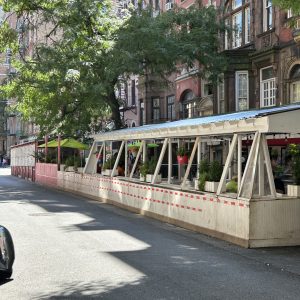 By Megan Fitzpatrick
By Megan Fitzpatrick
Earlier this month, Mayor Adams signed a bill that approved a permanent program for outdoor dining. As many of you know, outdoor dining grew exponentially in New York out of necessity due to the pandemic. Now, the City are looking to make ‘sidewalk cafes’ and seasonal ‘roadside cafes’ more affordable, accessible, and equitable for business owners.
Manhattan Community Board 7 will host a joint committee meeting between the Business and Consumer Issues Committee and the Transportation Committee on Wednesday, September 13th at 6:30 pm to discuss recommendations to the Department of Transportation for this new legislation. You can sign up and join the conversation at this LINK.
While LANDMARK WEST! Support businesses and recognize the need for an emergency outdoor dining program during a time of economic instability, we believe there are still many specific issues to consider, especially surrounding the unique needs of our historic districts. Here are some of our criticisms and concerns:
- Enclosed sidewalk cafes have proven to be obstructive in already dense and narrow city environments. They can block views to traffic for pedestrians, create unnecessary barriers for the disabled like wheelchair users and blind residents, and roadside cafes have even led to, or become the victims of motor accidents. There is a discussion to be had regarding their presence in narrow residential side streets in landmarked and non-landmarked districts and whether sidewalk and roadside cafes should be limited to commercial thoroughfares.
- The temporary nature of roadside cafes, where furniture has to be movable, begs the question, what is going to be done with this itinerant material in the off-season and the current breakdown of now unlicensed sidewalk sheds? Will businesses have the storage capacity for this, or would this legislation invite further material waste, running counter to this same administration’s pursuit of green infrastructure initiatives?
- Does the Department of Transportation have the staffing capacity to process the likely high volume of licenses expected? Who will inspect compliance, and how frequently?
- Throughout this process, the public has raised several quality-of-life concerns. Since the implementation of the emergency outdoor dining program, these sheds and platforms have become a breeding ground for mosquitos and vermin, with lingering smells disturbing nearby residents and passersby. Whose responsibility is removal when a lease is up or a restaurant closes? Will there be accommodations made in this bill to actively tackle these problems and provide accommodation for trash etc.? Another frequent complaint has been the excessive noise sidewalk and roadside cafes often create. We propose that 10pm is a more appropriate cut-off time, as opposed to the much-discussed 12am cession because most restaurants close at 10 pm and these are the non-construction quiet hours mandated by the City.
- The lower cost of obtaining a license is more equitable – but will the lower threshold encourage shoddier construction at potential risk to public safety?
- How will this affect retail rents? Will corner sites be able to charge hire rent? Will restaurants bleed further onto residential side streets? Can they be ganged in endless chains? Currently there is a caravan of sheds on West 73rd Street which run 139 feet from the corner, this contiguous row impacts not only the character of the street but turns the sidewalk into a business making it not only more difficult for residents to navigate but exist on as there are few places to dispose of trash and recycling.
